#105 The G|O Briefing, July 14, 2022
Reading tips for a hot summer
This is an onsite, slightly edited republication of the complete G|O Briefing newsletter
A slightly different Geneva Observer Briefing today. With Jamil Chade and Sarah Zeines off, and International Geneva heading into summer vacation, I thought I’d share with you a few of the best books, reports, and policy papers I’ve come across recently while putting our latest Briefings together. I’ll gladly admit that it’s a bit of a wonk’s holiday reading list, but I hope you might want to add these recommendations to the thrillers, the great (science) fiction or poetry volumes, the biographies—you fill in the blanks—already stashed in your tote bag or stored on your e-reader. They are bunched together loosely, but there is a common thread across all of them: trying to make sense of this moment of global, profound and, in all likelihood, long-lasting upheaval.
- PHM
HUMAN RIGHTS COUNCIL
I’ll start with six online maps from the Konrad Adenauer Stiftung – Multilateral Dialogue showing the key votes from the Council’s 50th session. This is KAS’s summary of the event: “The 50th UN Human Rights Council convened in Geneva from 13 June to 8 July. The impact of the Russian war of aggression against Ukraine was one of the main topics in the debates. Amongst others, the EU delivered a joint statement on food security. The increasing restrictions and repression of human rights and fundamental freedoms in Russia, especially since Russia’s repeated illegal invasion of Ukraine were also addressed. The situation in China was also addressed and the prompt release of the report on Xinjiang was demanded. In addition, gender was one of the central issues. An urgent debate on women's rights in Afghanistan was held and numerous resolutions were adopted, including one on the extension of the mandate of the independent expert on protection against violence and discrimination on the basis of sexual orientation and gender identity. The mandate of the Special Rapporteur on Belarus was also extended.”
ARTIFICIAL INTELLIGENCE
Following last week’s take on the Geneva Science and Diplomacy Anticipator (GESDA), several of our recommended reads are on the topic of science and technology today.
Say hi to AI. With so much written on the subject, Cade Metz’s The Genius Makers is among the most enjoyable primers, introducing the faces behind the development of a technology that is encroaching on just about every aspect of our individual and collective lives. No need to have a scientific background to read Metz’s jargon-free, hugely entertaining and informative book. Metz, a technology reporter for the New York Times, is an engaging writer and storyteller: “By the time he stepped onto the bus in downtown Toronto, bound for Lake Tahoe, Geoff Hinton hadn’t sat down for seven years,” is his book’s opening sentence. Going back to AI’s early days, he is at his best when describing a decade-long rivalry still resonating today between the ‘symbolists’ and the ‘connectionists’, two opposing camps of AI researchers. He does an equally fine job of vividly rendering the characters and personalities of today’s AI elite researchers—spoiler: a battle of oversized egos—or describing the intense competition and enormous sums offered by companies trying to poach them—“borderline crazy money,” as one of his characters puts it—and provide them with massive amounts of expensive supercomputing power to achieve their grand and often controversial visions.
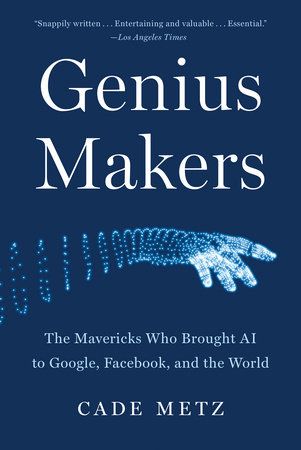
But wait a minute: AI is neither artificial nor intelligent, contends AI scholar Kate Crawford in Atlas of AI, Power, Politics, and the Planetary Costs of Artificial Intelligence—a great conversation starter line, no doubt, in the Valley, or indeed closer to here at EPFL. “Rather,” she writes, in her piercing analysis, “artificial intelligence is both embodied and material, made from natural resources, fuel, human labor, infrastructures, logistics, histories, and classifications.” So much for artificial. And if, in her view, it is not intelligent either, that’s because “AI systems are not autonomous, rational, or able to discern anything without extensive, computationally intensive training with large datasets of predefined rules and rewards.” In addition, Crawford, an AI expert of great standing, doesn’t shy away from debunking what she believes to be two foundational myths of the field. The first is that nonhuman systems are similar to human minds, which assumes that sufficient training and resources—machine learning applied to large datasets—will allow the creation of human-like intelligence. “The second myth,” she contends, “is that intelligence is something that exists independently, as though it were natural and distinct from social, cultural, historical, and political forces. In fact, the concept of intelligence has done inordinate harm over centuries and has been used to justify relations of domination from slavery to eugenics.” What she does with her book, in other words, is take a wider lens to the discussion of AI to examine its political, physical, and environmental dimensions.
Crawford’s book is a timely and essential contribution to the conversation around AI. It encourages us to go beyond the “AI for good” platitudes and the problems of ethics and to consider the full impact of this profoundly transformational technology. On the environmental side, Crawford—a research scholar at Microsoft and visiting chair of AI and Justice at the Ecole Normale Supérieure in Paris—reminds us that AI is an extractive industry. Hence the Atlas in her book’s title: she takes us across the globe to places where the rare earth elements at the industry’s core are mined—“a brutal undertaking”—and to the data centers where our data is virtually extracted, and upon which AI depends.
Hers is a political book. She defines AI as a “massive industrial formation that includes politics, labor, culture, and capital,” arguing that “AI systems are ultimately designed to serve existing dominant interests.” Therefore, she maintains, while recognizing machine learning’s undeniable contributions to solving some very complex problems, we need to go beyond the technical prowess, the algorithmic breakthroughs, to ultimately ask ourselves: “what is being optimized, and for whom, and who gets to decide.”
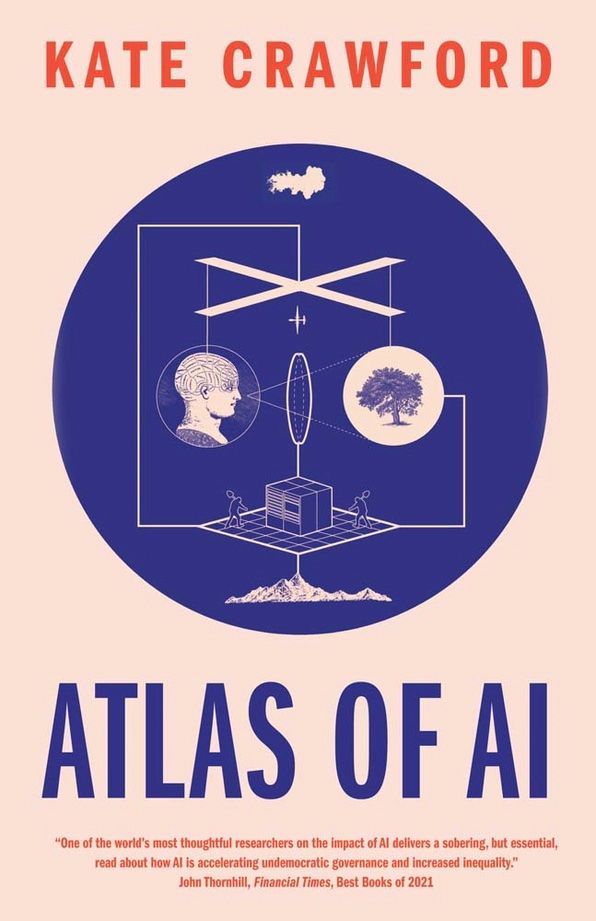
What role, if any, will AI come to play in organizing human affairs? Could the technology help our societies make better decisions? Researchers at Alphabet’s Deep Mind, the company behind the Alpha Go system featured in both Metz and Crawford’s books, certainly believe so. They’ve just published ‘Democratic AI’, a research paper that its authors say demonstrates that deep learning can be used to find economic policies that people will vote for by a majority, using a simple game.
The final document under the AI heading is a scientific article on how, according to its authors, Google’s “autocomplete” algorithms—the unnerving feature that selects words for you when texting—reflect and amplify power imbalances between Western technology companies and multilingual internet users in the Global South.
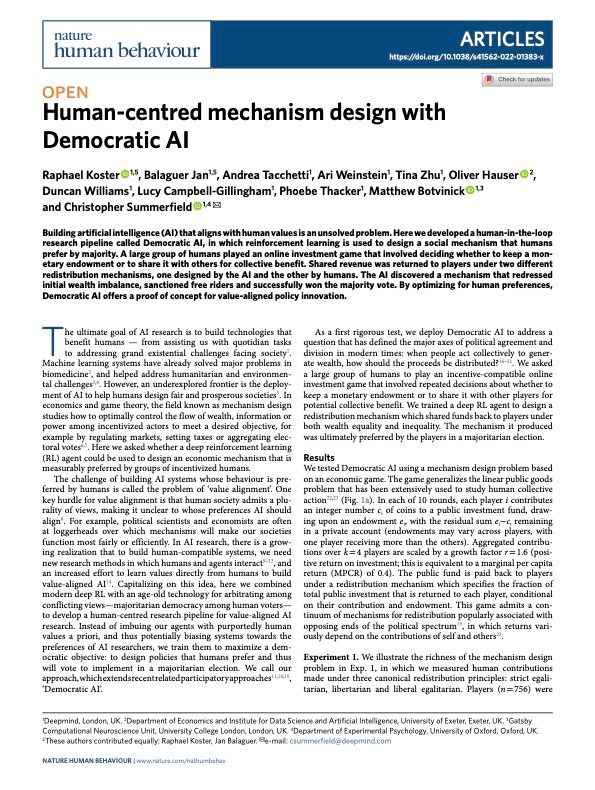
CLIMATE CHANGE
The long view always helps. Three UK-based researchers have just published a comprehensive survey mapping the extent to which public funds have been allocated to fight climate change over the past 30 years. Their data-driven research revealed that climate change adaptation ranks first, followed by climate mitigation through the optimization of energy systems, transportation, geoengineering, and industrial decarbonization.
GLOBAL GOVERNANCE
If you missed it when we published our interview with Michael J. Barnett, Global Governance in a World Of Change is truly worth a read. As we wrote at the time, “International Geneva talks a lot, in mostly self-serving ways, about what it does. But this very dense network says almost nothing about how and why it operates, what forces and influences shape its contours, and its interactions. It is one of the chief merits and virtues of Global Governance in a World of Change, but by no means the only one, to address these questions and answer them by providing a conceptual framework to better understand this unique ecosystem.” Geneva readers might also be particularly interested in the chapter on Global Health by the Graduate Institute’s Suerie Moon, and Vincent Bernard and Anne Quintin’s on the ICRC.
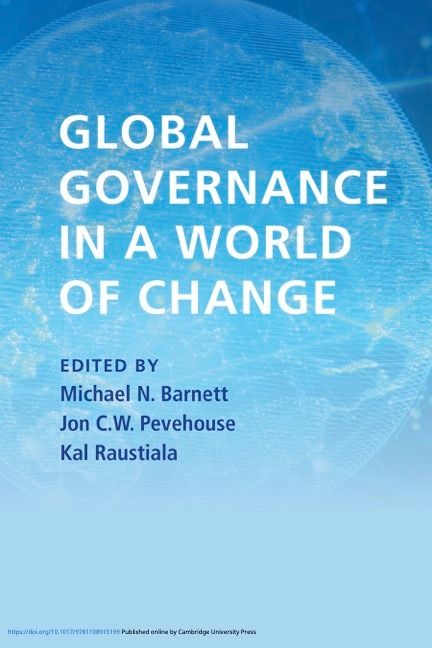
CHINA
The final item on our list links back to the maps from KAS. “China does not have any other partner of the same strategic weight as Russia, who shares [its] distrust of the current international order,” Bilahari Kausikan, Singapore’s former ambassador to Russia and the United Nations, was recently quoted as saying in The New York Times, in a piece analyzing China’s position towards Russia after it attacked Ukraine.
For Beijing, that “current international order” is of course the global governance system created in 1945 by the US and supported by the West and its allies, an order that China is now fully bent on completely restructuring to reflect the new geopolitical realities of today, abandoning in the process the values the current order embodies. That fierce competition between the two blocs is increasingly polarized, structured by profoundly different ideologies and anchored in radically opposed political systems.
How China means to achieve its goals, and where it is leading the charge, is the subject of ‘China, The Battle of Coalitions’, a very recent paper by Alice Ekman, Senior Analyst in charge of the Asia portfolio at the European Union Security Institute. “China’s coalition-building efforts are currently supported by Russia and a growing number of countries, and fueled by strong resentment against the United States and its allies,” Ekman writes.
International Geneva is at the very epicenter of China’s efforts: “China has learned step-by-step how to build voting coalitions at the UN and in other multilateral arenas,” she writes, stressing that “through its diplomatic endeavors China is not only seeking to promote a specific type of domestic governance beyond its borders but also to restructure the global governance system. In particular, it wishes to craft a new approach to security and conflict intervention at the United Nations and other multilateral organizations.”
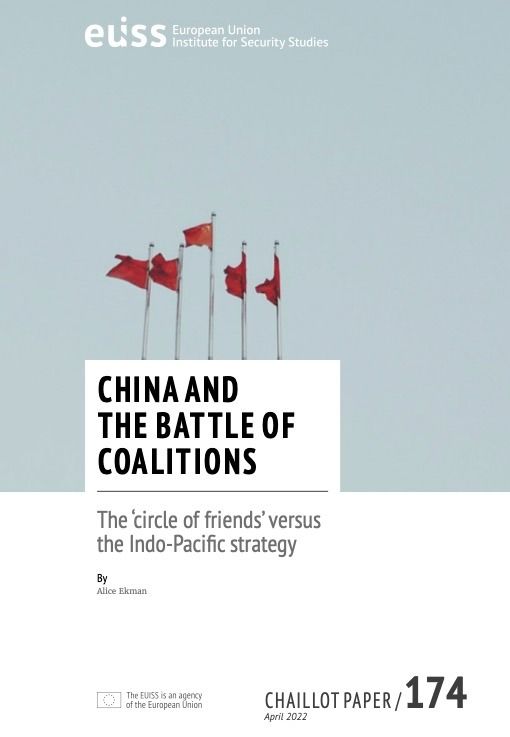
Happy reading, and enjoy the summer. We will be taking a summer break ourselves. We will be back in your inbox on August 25th.
Today's Briefing: Philippe Mottaz
Editorial Assistance: Ciara O'Donoghue
Edited by: Dan Wheeler

